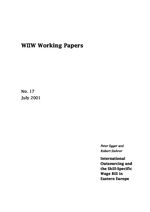International Outsourcing and the Skill-Specific Wage Bill in Eastern Europe
The paper analyses the effects of international fragmentation in terms of intermediate goods trade on the dynamics of skill-specific real wage bills in manufacturing of three Central and East European countries (Hungary, Poland, the Czech Republic). Both intermediate goods exports and imports of the CEECs exhibit a positive impact on the unskilled workers' wage bill. Since 1993, intermediate goods trade with the European Union alone has accounted for a reduction of about 58 per cent of the predicted annual change in the skilled-to-unskilled wage bill ratio in Hungary's manufacturing. The corresponding contribution was 31 per cent in the Czech Republic and 30 per cent in Poland.
Keywords: international outsourcing, wage effects, panel econometrics
JEL classification: C33, F14, F15, F16, F40
Countries covered: Czechia, Hungary, Poland, Visegrad countries
Research Areas: Labour, Migration and Income Distribution, International Trade, Competitiveness and FDI
